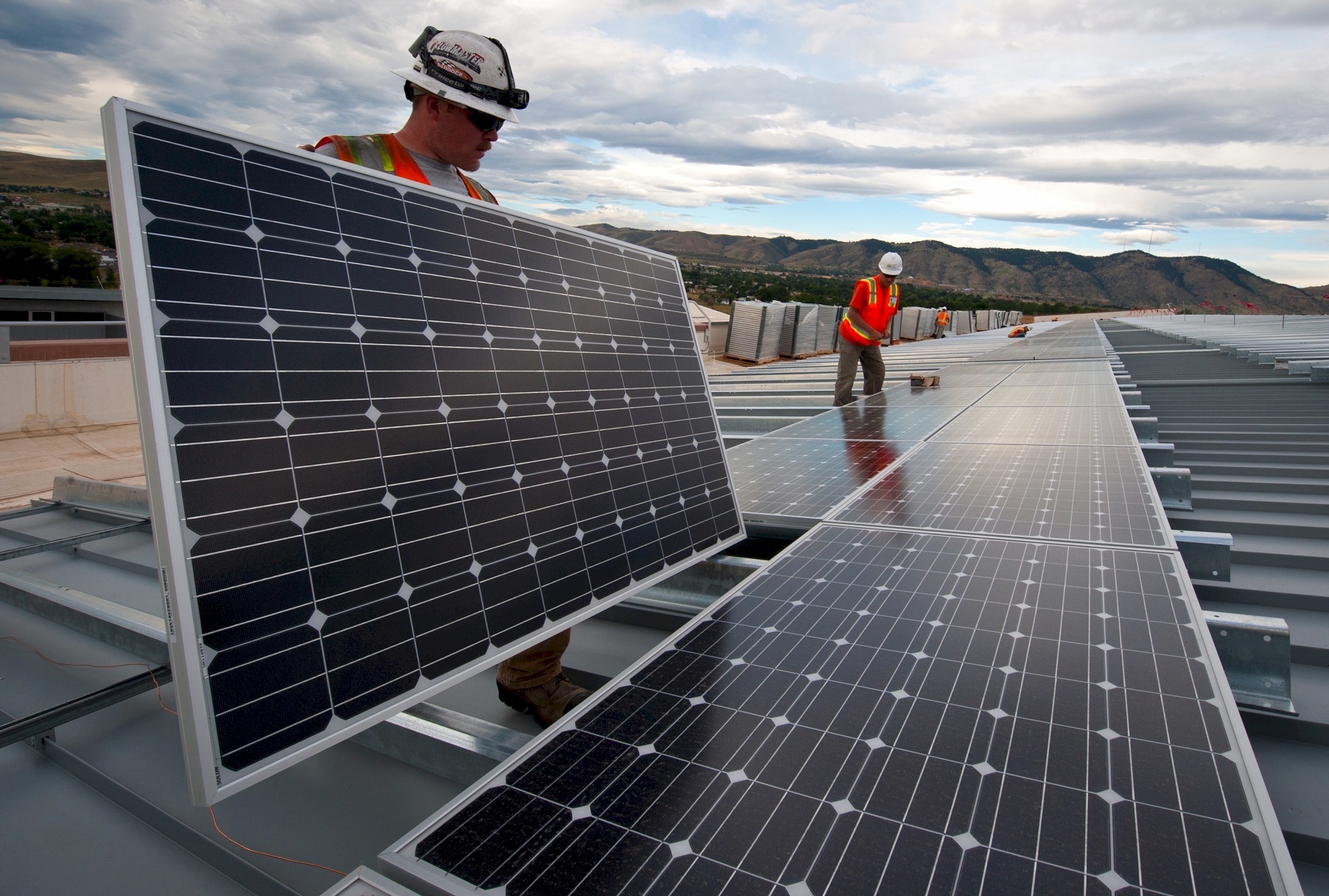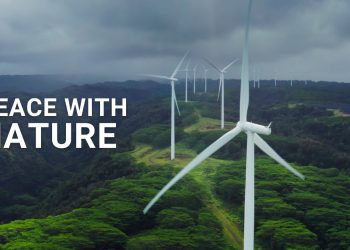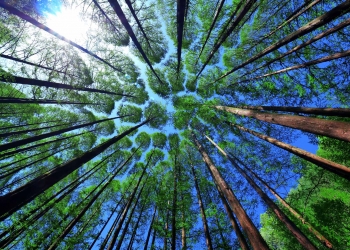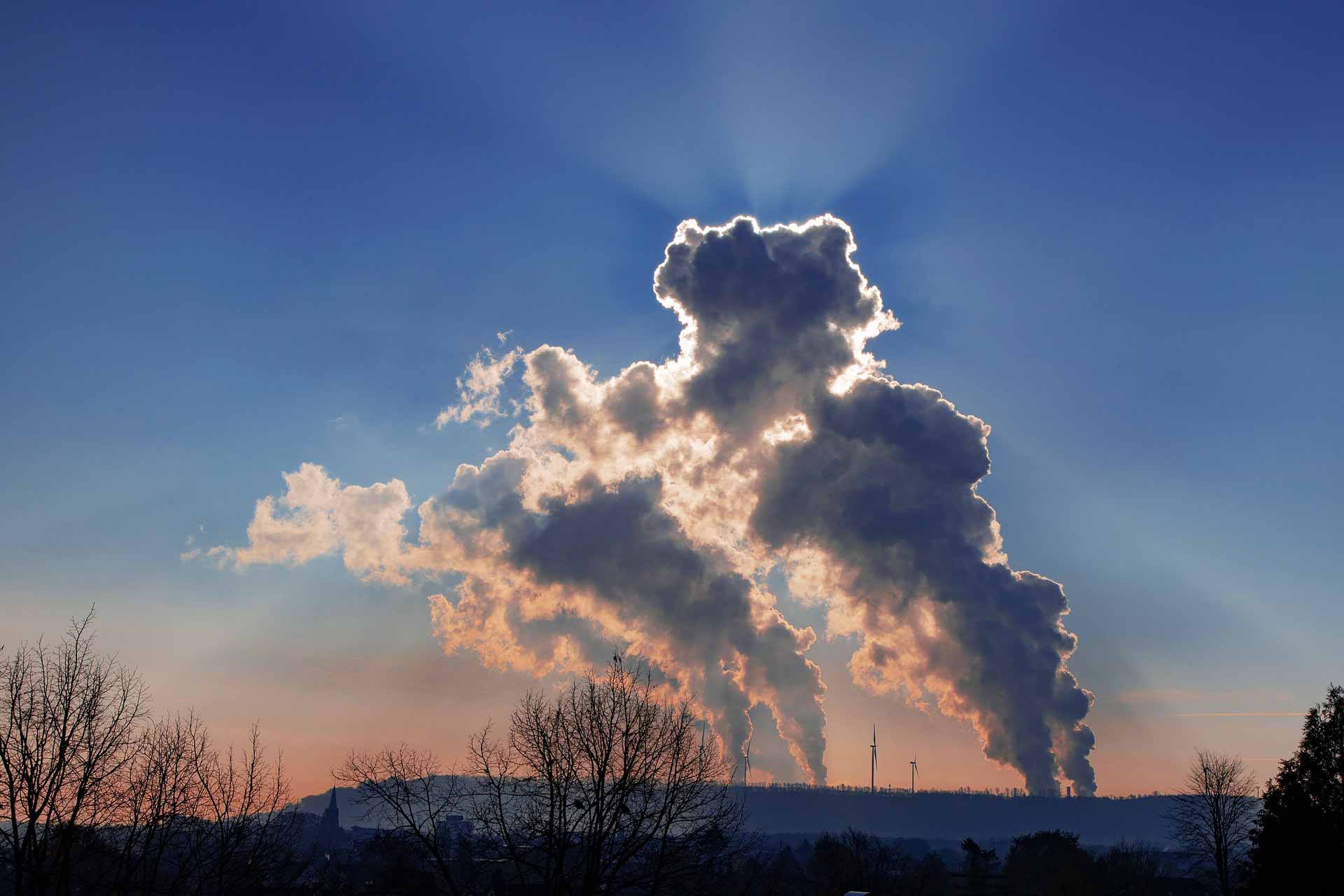Share of renewable energy more than doubled between 2004 and 2019. Wind and water provide most renewable electricity while solar is the fastest-growing energy source. The data come from Eurostat which produces European statistics in partnership with National Statistical Institutes. High quality statistics and data on Europe improve evidence-based EU policy making and supports public and private investment plans.
Becoming the world’s first climate-neutral continent by 2050 is the objective behind the European Green Deal. It is the very ambitious package of measures and vdLcommission. It promises to enable European citizens and businesses to benefit from sustainable green transition.
What are the renewable energy resources?
Renewable energy is useful energy that is collected from renewable resources. These are naturally replenished on a human timescale. They include carbon neutral sources like sunlight, wind, rain, tides, waves, and geothermal heat. The term often also encompasses biomass as well, whose carbon neutral status is under debate.
Renewable energy sources include wind power and solar power (thermal, photovoltaic and concentrated). Also hydro power, tidal power, geothermal energy, ambient heat captured by heat pumps, biofuels and the renewable part of waste.
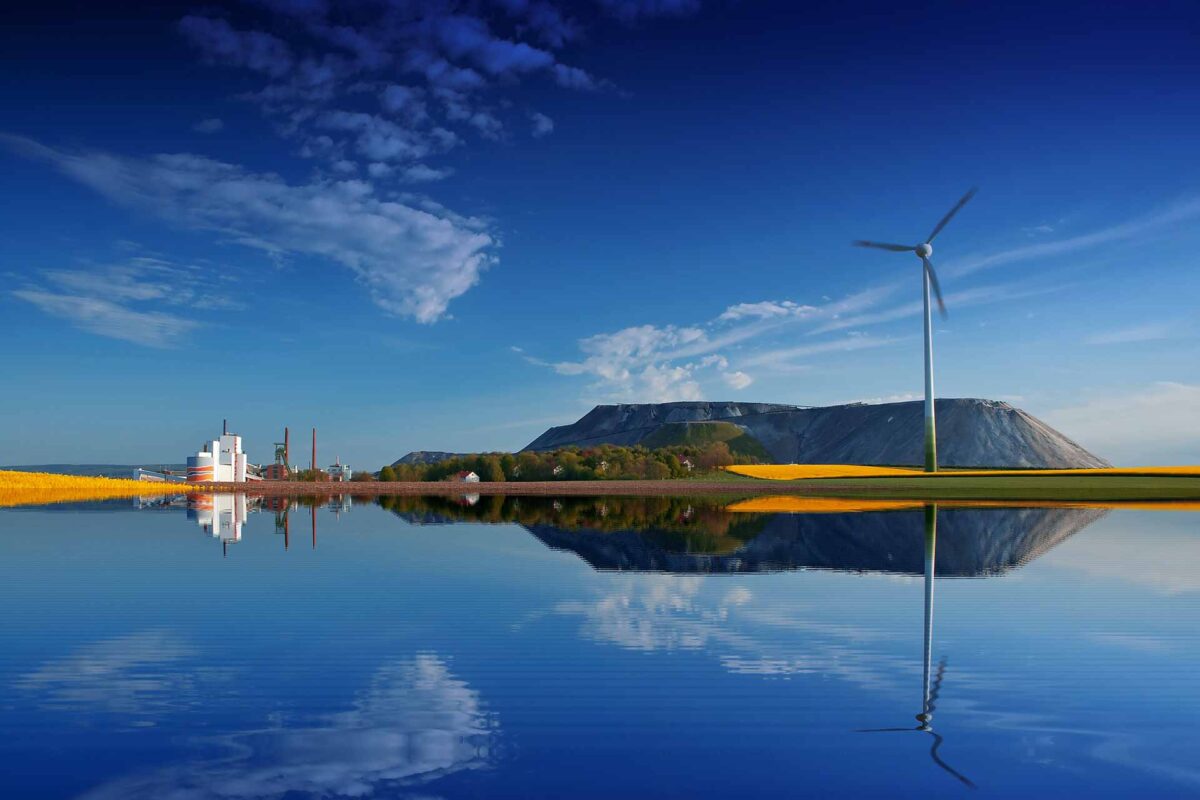
The use of renewable energy has many potential benefits. It includes a reduction in greenhouse gas emissions, the diversification of energy supplies. Also it focus on reduced dependency on fossil fuel markets (in particular, oil and gas). The growth may also stimulate employment in the EU. Policy makers expect the creation of jobs in new ‘green’ technologies.
In 2019, renewable energy represented 19.7 % of energy consumed in the EU-27. It was only 0.3 % short of the 2020 target of 20 %. The share of energy from renewable sources used in transport activities in the EU-27 reached 8.9 % in 2019.
Share of renewable energy more than doubled between 2004 and 2019
The EU seeks to have a 20 % share of its gross final energy consumption from renewable sources by 2020; this target is distributed between the EU Member States with national action plans designed to plot a pathway for the development in each of the Member States. Figure 1 shows the latest data available for the share of renewable energies in gross final energy consumption and the targets that have been set for 2020. The share of renewables in gross final energy consumption stood at 19.7 % in the EU-27 in 2019, compared with 9.6 % in 2004.
Has the Paris Agreement changed Climate after 5 years?
This positive development has been prompted by the legally binding targets. EU focus on increasing the share of energy from renewable sources enacted by Directive 2009/28/EC on the promotion of the use of energy from renewable sources. While the EU as a whole is on course to meet its 2020 targets, some Member States will need to make additional efforts to meet their obligations as regards the two main targets. The overall share in the gross final energy consumption (see Figure 1) and the in transport (which is dealt with further on in this article, see Figure 4 and Table 4).
2019 sources data vs 2020 targets
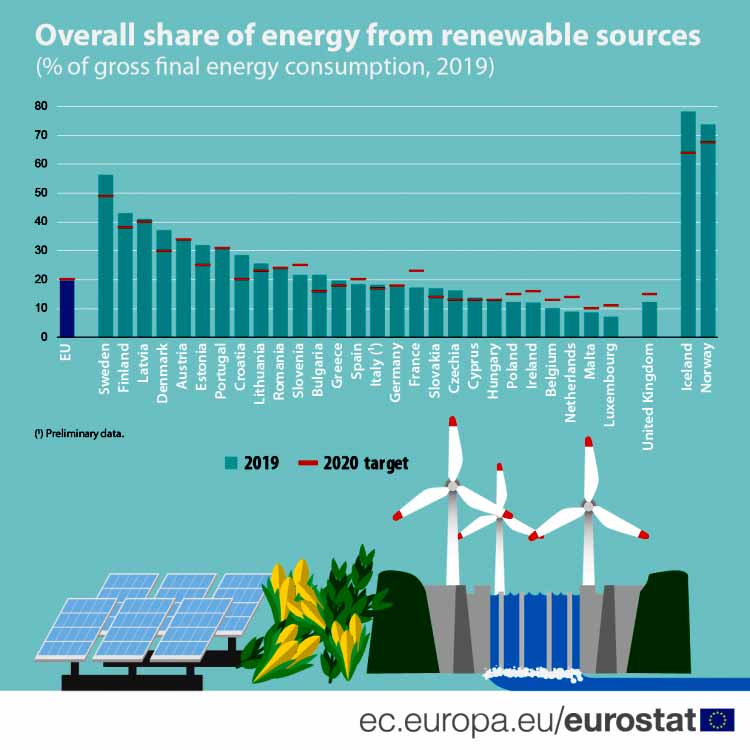
With more than half of energy from renewable sources in its gross final consumption of energy, Sweden (56.4 %) had by far the highest share among the EU Member States in 2019, ahead of Finland (43.1 %), Latvia (41.0 %), Denmark (37.2 %) and Austria (33.6 %). At the opposite end of the scale, the lowest proportions of renewables were registered in Luxembourg (7.0 %), Malta (8.5 %), the Netherlands (8.8 %) and Belgium (9.9 %). When looking at the national targets, fourteen Member States have already surpassed their targets for 2020. Six countries are near their targets: Hungary, Austria and Portugal at 0.4 percentage points (pp) from their national targets, Germany (0.6 pp), Malta (1.5 pp) and Spain (1.6 pp). By contrast, still quite far from their national targets are France (5.8 pp), the Netherlands (5.2 pp), as well as Ireland and Luxembourg (both 4.0 pp).
Germany should invest more in infrastructure, digital economy and energy transition
Table 1 presents data for all reporting countries and also the values of the indicative trajectory.
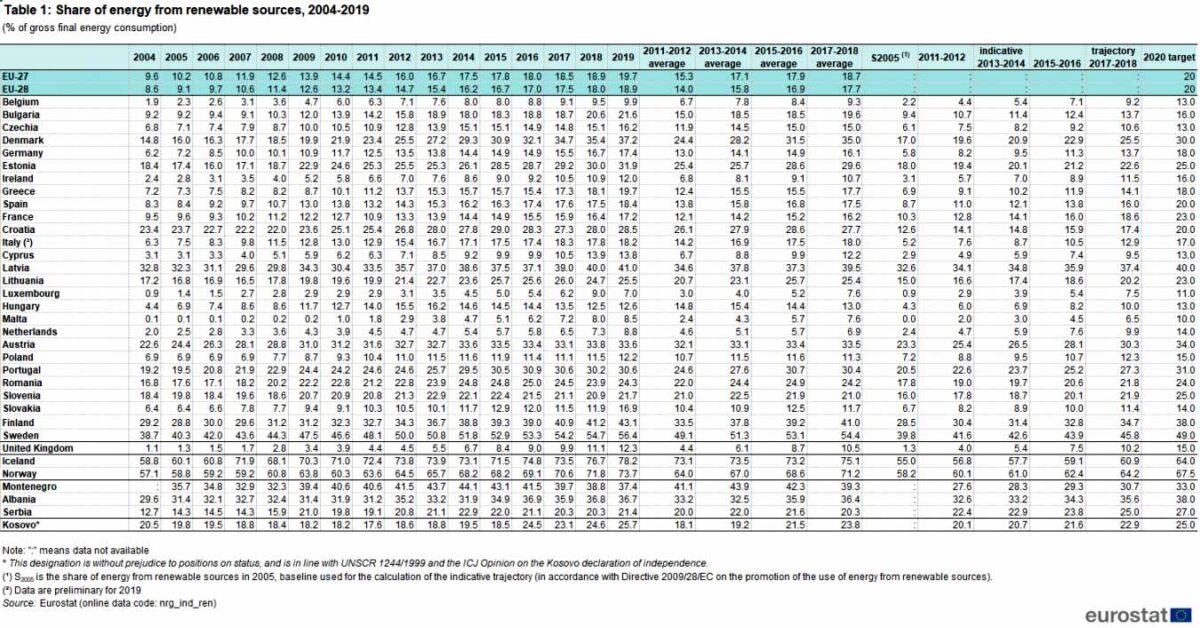
Wind and water provide most renewable electricity; solar is the fastest-growing renewable energy source
The accounting rules in Directive 2009/28/EC prescribe that electricity generated by hydro power and wind power have to be normalised to account for annual weather variations (hydro is normalised over the last 15 years and wind over the last 5 years). This article presents the results applying these accounting rules.
The growth in electricity generated from renewable energy sources during the period 2009 to 2019 largely reflects an expansion in three sources across the EU. Principally these are wind power, but also solar power and solid biofuels (including renewable wastes). In 2019, renewable energy sources made up 34 % of gross electricity consumption in the EU-27. It was slightly up from 32 % in 2018. Wind and hydro power accounted for two-thirds of the total electricity generated from renewable sources (35 % each).
Solar Power in Europe
The remaining one-third of electricity generated was from solar power (13 %), solid biofuels (8 %) and other renewable sources (9 %). Solar power is the fastest-growing source: in 2008, it accounted for 1 %. This means that the growth in electricity from solar power has been dramatic. There is a rising from just 7.4 TWh in 2008 to 125.7 TWh in 2019. The share in electricity in Figure 2.
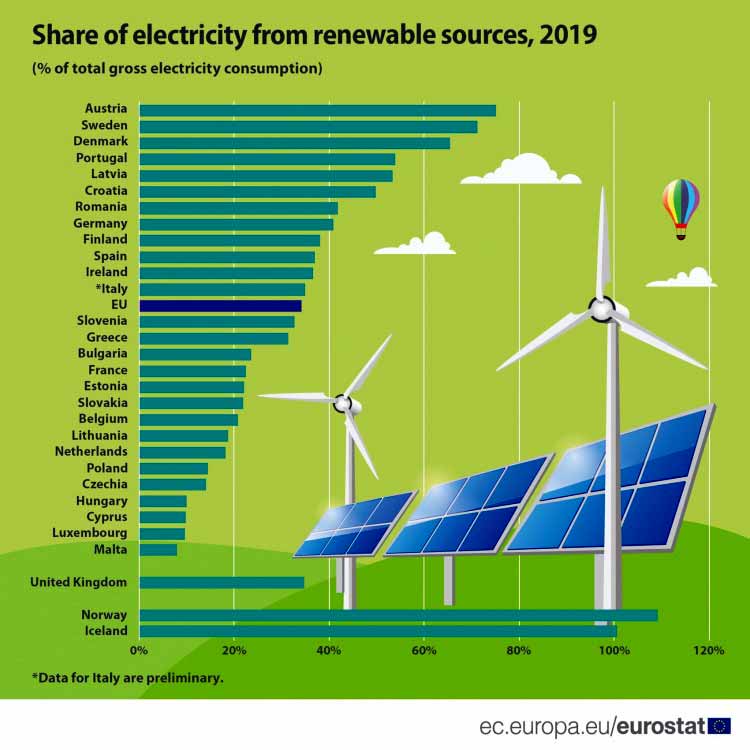
(% of gross final energy consumption)
Source: Eurostat
Among the EU-27 Member States, more than 70 % of electricity consumed in 2019 was generated from renewable sources in Austria (75 %) and Sweden (71 %). The consumption of electricity from renewable sources was also high in Denmark (65 %), Portugal (54 %) and Latvia (53 %), accounting for more than half of electricity consumed. At the other end of the scale, the share of electricity from renewable sources was 10 % or less in Malta (8 %), Cyprus, Luxembourg and Hungary (all 10 %), see Table 2.

Over one fifth of energy used for heating and cooling from renewable sources
In 2019, renewable energy accounted for 22.1 % of total energy use for heating and cooling in the EU-27, increasing from 11.7 % in 2004. Developments in the industrial sector, services and households contributed to this growth. Aerothermal, geothermal and hydrothermal heat energy captured by heat pumps for heating purposes is taken into account. The share in heating and cooling in Figure 3.
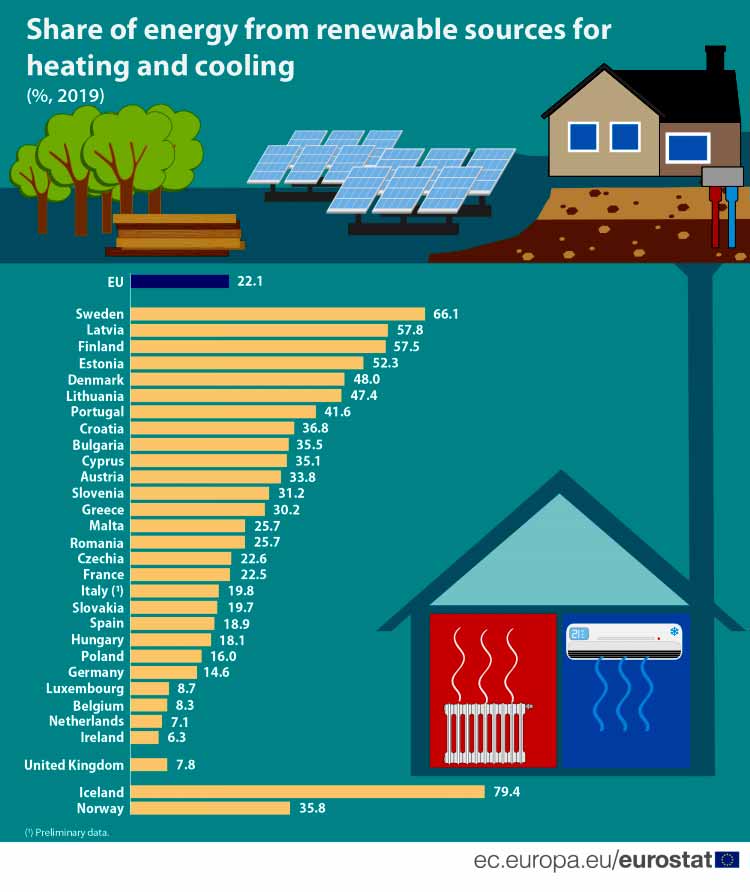
(% of gross final energy consumption)
Source: Eurostat
Among the EU-27 Member States the share of energy from renewable sources in heating and cooling was more than half in Sweden (66.1 %), Latvia (57.8 %), Finland (57.5 %) and Estonia (52.3 %). At the other side of the scale, the EU-27 Member States with a share of energy from renewable sources in heating and cooling of less than 10 % were Ireland (6.3 %), the Netherlands (7.1 %), Belgium (8.3 %) and Luxembourg (8.7 %), see Table 3.
UNEP: Sustainable development and fight against COVID-19 go together
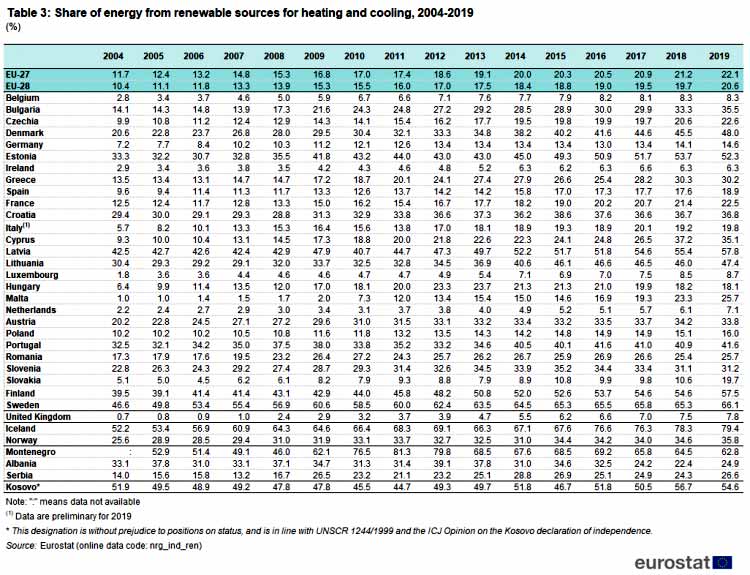
8.9% of renewable energy used in transport activities in 2019
The EU agreed to set a common target of 10 % for the share of renewable energy. This target includes liquid biofuels, hydrogen, biomethane, ‘green’ electricity, etc. used in transport by 2020.
The average share of energy from renewable sources in transport increased from 1.6 % in 2004 to 8.9 % in 2019. Among the EU-27 Member States, the share of renewable energy in transport fuel consumption ranged from highs of 30.3 % in Sweden, 21.3 % in Finland and 12.5 % in the Netherlands down to 4 % or less in Greece and Lithuania (both 4.0 %) and Cyprus (3.3 %). The EFTA country Norway also reported a high share in transport fuel consumption (27.6 %), see Figure 4.
Western Balkans discover EU through Green and Digital transition
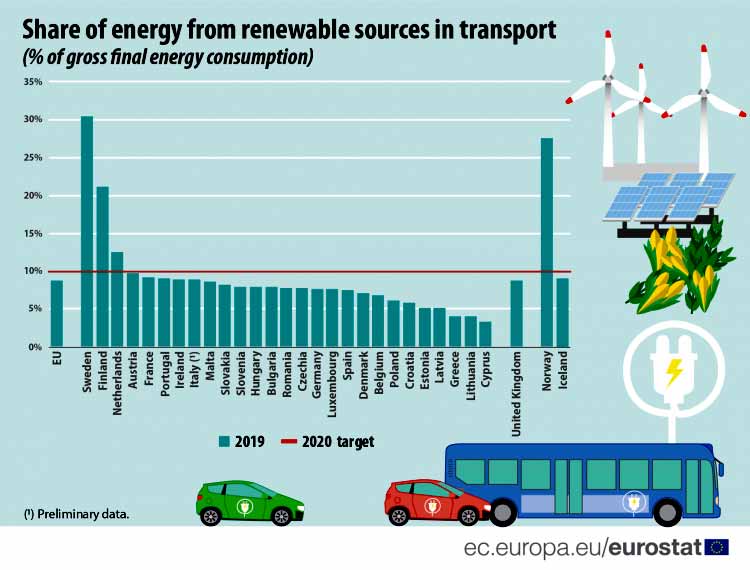
In 2019, 22 EU-27 Member States registered an increase in the average share of energy from renewable sources in transport compared with 2018. The largest increases observed for Finland (+3.6 percentage points (pp)), Croatia (+3.3 pp), the Netherlands (+2.9 pp) and Slovenia (+2.5 pp). The EFTA country Norway also registered a substantial increase (+6.1 pp).
More details on the share in transport in Table 4.
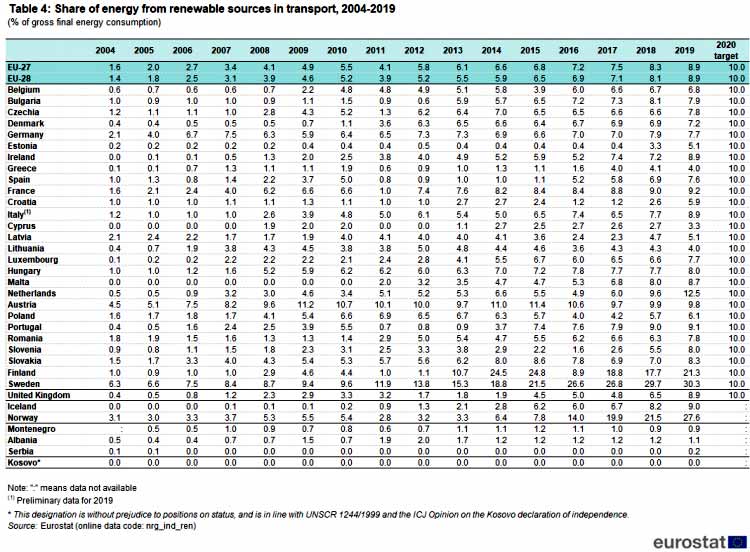
Share of renewable energy more than doubled between 2004 and 2019, where wind and water are the most popular and solar the fastest-growing.

